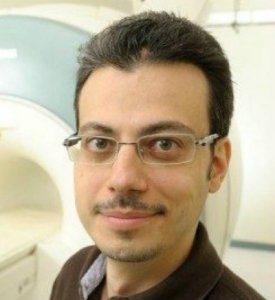Presented By: Department of Psychology
CCN Forum-Brain Network Properties in Aging: A Graph-Theoretic Approach
Alexandru (Alex) D. Iordan, Research Fellow working with Dr. Patricia Reuter-Lorenz

Talk Abstract: Growing evidence suggests that healthy aging affects the configuration of large-scale brain networks. Functional brain organization has traditionally been studied using fMRI-based “resting-state” functional connectivity and more recently, in conjunction with graph-theoretic analyses. The graph-theoretic approach enables characterization of the brain’s connectivity structure and derives measures that assess global and local features that may be important for network function. First, I will provide a brief introduction to network theory, focusing on key topological network properties, such as modularity. Then, I will present several representative results from recent fMRI investigations showing age differences in global and local network properties. Finally, I will highlight several methodological aspects that are relevant for functional connectivity and network measures calculations.
Brief Bio: Alex is a postdoctoral Research Fellow in the Department of Psychology, working with Dr. Patricia Reuter-Lorenz. His main research interests are in understanding the structure and dynamics of the large-scale brain networks that mediate interactions between cognitive control and emotion, as well as the roles of aging and training in these interactions. Alex is from Bucharest, Romania. After completing his undergraduate and graduate studies in Psychology and Neurobiology and the University of Bucharest, he joined the Ph.D. program in Neuroscience at the University of Illinois at Urbana-Champaign, where he studied the effects of emotional distraction on working memory using brain imaging. In 2016, he joined the Psychology Department at the University of Michigan, where he is currently working on several projects, including the investigation of large-scale brain networks in aging and the effects of cognitive training. His research has been published in several journals including Cerebral Cortex, Frontiers in Aging Neuroscience, Cognitive Affective and Behavioral Neuroscience, and Biological Psychology.
Brief Bio: Alex is a postdoctoral Research Fellow in the Department of Psychology, working with Dr. Patricia Reuter-Lorenz. His main research interests are in understanding the structure and dynamics of the large-scale brain networks that mediate interactions between cognitive control and emotion, as well as the roles of aging and training in these interactions. Alex is from Bucharest, Romania. After completing his undergraduate and graduate studies in Psychology and Neurobiology and the University of Bucharest, he joined the Ph.D. program in Neuroscience at the University of Illinois at Urbana-Champaign, where he studied the effects of emotional distraction on working memory using brain imaging. In 2016, he joined the Psychology Department at the University of Michigan, where he is currently working on several projects, including the investigation of large-scale brain networks in aging and the effects of cognitive training. His research has been published in several journals including Cerebral Cortex, Frontiers in Aging Neuroscience, Cognitive Affective and Behavioral Neuroscience, and Biological Psychology.